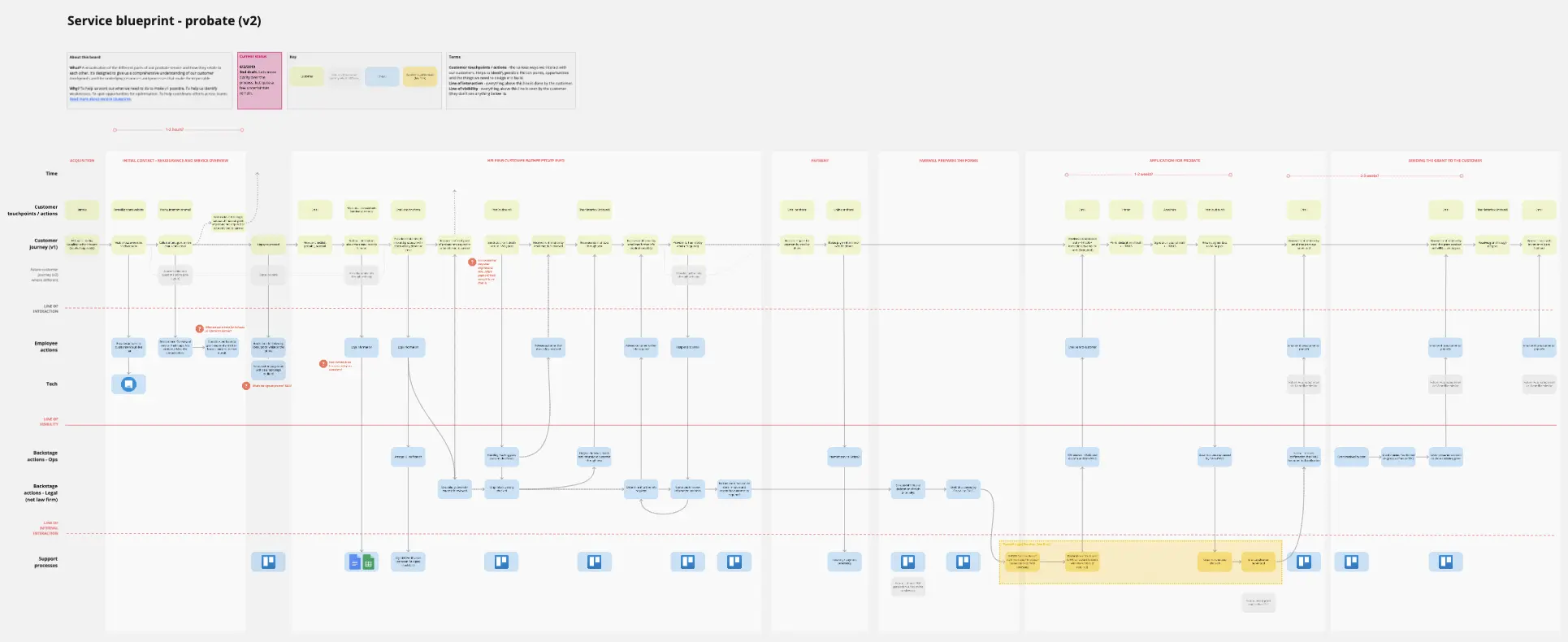Problem
Until 2019, Farewill did one thing – wills. The company knew there was more it could do to change the way the world deals with death. It identified an opportunity to launch its second service – probate.
How can we launch a probate service that changes the way people deal with death?
Project
I was part of a small project team tasked with researching and designing a unique, customer-centric proposition for probate.
Team
Me – sole product designer and researcher working in-house as part of a multi-disciplinary project team, including: COO / project lead (Constance), Head of Legal (Loz), Developer (Emily).
Although not a typical product team, we ran daily stand-ups and weekly retros to discuss progress, raise issues, plan the next week and be clear on what we’re all doing.
Process
I ran a discovery research phase, including a focus group with bereaved relatives. Focus groups are rarely seen in product design, usually for good reason. But for generative research, in the right circumstances, they can be hugely impactful. Death, for example, is an emotional, rarely-discussed topic – the group format was beneficial because the participants consoled each other and aired their unique experiences. It was like a support group.

Above: me facilitating a focus group

Above: a quote from a focus group participant
Along with other generative research like interviews and market research, I ran group analysis sessions. I’m a big believer that research is a team spot, and group analysis can help us reach better outcomes. I encouraged others at Farewill (then, there were only about 18 of us), to watch and read the research so far. Then, I ran a workshop where we each expressed the takeaways as job stories.
A job story is much like a user story. It follows this format:
When I __ I want to __ So I can __
Job stories help us express needs from the customer’s perspective. As a team we wrote about 50. After the session, I sense-checked, refined, filtered and grouped the results.

I arranged a further group session to prioritise the job stories. We then re-worded them and arranged them into goals, motivations and frustrations.
I used these conclusion to form our persona – a representation of evidence, expressed as an individual, to help us stay focused on customer needs. We gave the persona a photo, a bio and a name — Carly. Carly represents our customers. During the project, we spoke of her often, and referred back to her when making decisions.

Every aspect of Carly is based on first-hand evidence.
As the project progressed, we worked through the considerations of how the service would be run. I helped design the service and drew up service blueprints to help visualise the choices we were making and identify areas for refinement.

The research fed directly into the service. As an example – we knew how often people have a feeling of confusion and being out of control when handing over probate work to a professional.
Outcomes
We successfully launched our new probate service on schedule, on 5 March 2019. At the time, I blogged about it here.
I’m hugely proud of the team and the process we went through – we could have launched a probate service faster, but we wanted to do it right.
Reflections
- The focus group video has become required viewing for anyone joining Farewill’s probate team – I’m so pleased we place such high value on empathy and first-hand research
- We created a fairly lengthy PDF form for our clients to complete. We knew it wasn’t perfect, and that feeling was validated by customer feedback. In hindsight, we should have kept it simple and gathered all information by phone from the start.
- Our goal was crystal clear (“launch a unique, customer-centric probate service by March 2019” ), and it was fun working towards it at pace as part of a small, focused team.